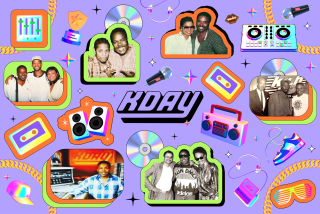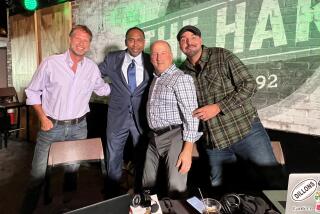‘A Sameness From Station to Station’
- Share via
Ever get the feeling that radio across the country all sounds the same? As you’re rolling down the interstate, the stations rise and fade, and they’re all called “The Beat” or “Froggy” or “Z-100” or “Party.” The games are the same, the voices are the same, the music is almost always the same.
It’s not just you. Even at the very top, apparently, radio executives have noticed that there’s a lot less variety on the air, and it worries them. A couple of weeks ago, during a country music conference in Nashville, John Gehron, the co-chief operating officer of industry giant Infinity Broadcasting, drew a lot of interest when he said: “I hear a sameness from station to station. I hear wonderful production and I don’t hear any personality.”
As reported in the industry journal Radio Ink, Gehron was responding to a question about the growth of “voice-tracking” or “cyber-jocking.” That’s when, through the use of computers and modern electronics, an announcer in one city can be the voice of half a dozen stations at once, giving station identifications and making comments just as if he or she were right there in the studio.
Sometimes, these “voice guys” morph into DJs, announcing songs and making patter--even if there’s a live jock in the studio. It’s not unknown.
Never mind the artificiality of pretending to broadcast live shows when they’re not (TV does that all the time, but it’s still considered sacrilege among radio purists). The huge broadcast conglomerates formed since deregulation in 1996--public companies beholden to stockholders, not listeners--are powerfully focused on the bottom line. And voice-tracking saves a lot of cash. In the words of Cox Long Island Vice President Kim Guthrie: “It’s about saving money. It’s efficient. The technology is there to do it.”
But a lot of that money is saved from the pay of DJs who don’t work there anymore. “It’s very common throughout every major corporation that owns stations,” Guthrie said. “You have this equipment, and you are able to do it. . . . You may have one person in a building with five stations--one person is live, the rest are voice-tracked.”
Which means that four other people don’t have jobs. Yet nights and weekends are when they train the new DJs: young, eager, willing to put up with all sorts of discomfort just to get on the air. That was where Gehron focused his concern. Where is the new talent going to come from? How is the next Elvis Duran or Howard Stern going to learn what works and what doesn’t?
“We haven’t been able to grow talent fast enough,” Gehron said in Nashville. “If we’re going to be successful, we need to grow talent.” He said he was trying to do that by asking station executives to give the local voices more time and space to develop personality. “I tell our program directors to use their DJs or we will ‘cyber-jock’ and ‘voice-track’ their stations.”
Those were welcome words to a lot of listeners. “It’s nice for someone at such a high level to say something like that,” Radio Ink editor Ed Ryan said. “We keep saying, ‘We’re local, we’re local, we’ll have personality-driven morning and afternoon shows,’ yet we’re dropping in ‘voice guys,’ we’re using those ‘voice guys’ and not training the new talent.”
More to Read
The biggest entertainment stories
Get our big stories about Hollywood, film, television, music, arts, culture and more right in your inbox as soon as they publish.
You may occasionally receive promotional content from the Los Angeles Times.










